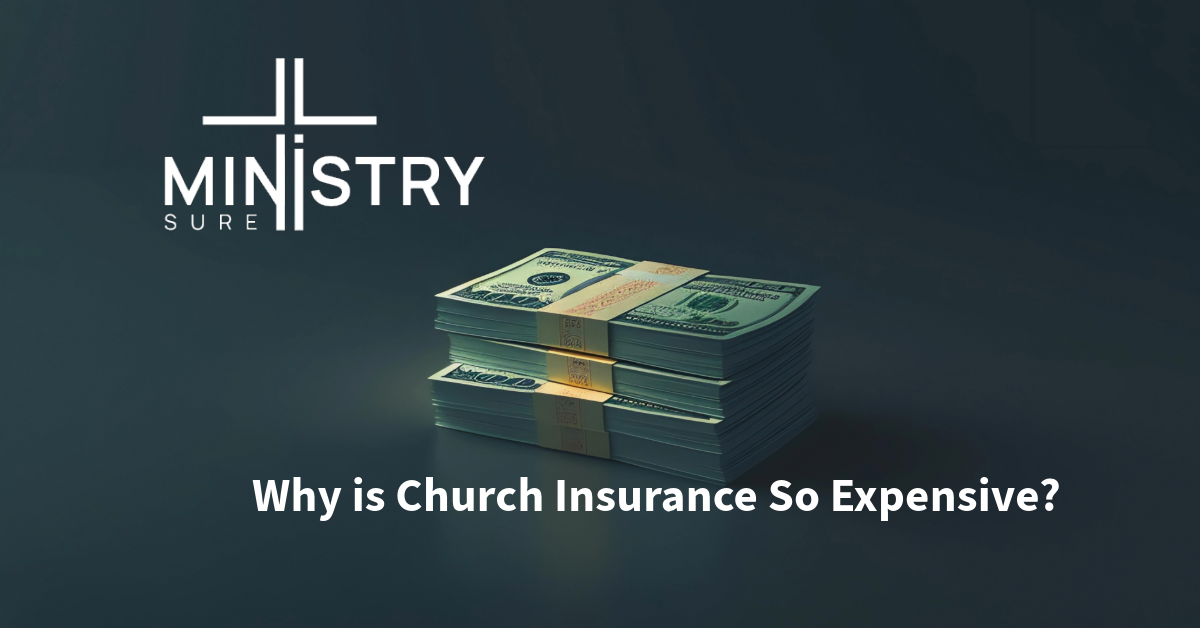Why is church insurance so expensive? We have some thoughts on it. Insurance for churches should provide the best possible protection. Understanding why church insurance tends to be more costly involves exploring the unique risks and needs of religious institutions.
Churches and other religious organizations, as well as non-profits, often require specialized coverage that addresses their particular vulnerabilities and operational specifics.
Here’s a detailed exploration of the factors contributing to the increase in premiums/rate increases across the insurance industry associated with church insurance, particularly for those in Georgia.
The Scope of Church Operations
Churches are not just places for worship services; they often serve as community centers, hosting a variety of events and activities. This broad scope of operations increases exposure to various risks, necessitating help from an insurance company well-versed in this type of insurance coverage.
Property Coverage
Churches typically own multiple church buildings, including the main sanctuary, offices, classrooms, and sometimes additional structures like gyms or community centers. Each building and its contents need protection against damage from natural disasters, fire, water damage, vandalism, and theft. The more property a church owns, the higher the insurance cost due to the amount of replacement cost.
Liability Coverage
With numerous activities and events, churches face significant liability risks. Liability coverage is essential to protect against claims resulting from accidents, injuries, or damages occurring on church property or during church-sponsored activities. This includes everything from slips and falls to more severe incidents that incur high medical costs.
Special Events and Programs
Churches often host special events such as weddings, funerals, festivals, and community outreach programs. Each event presents unique risks, requiring additional coverage. For example, a festival might need coverage for temporary structures, while a wedding may require special event insurance. These extra layers of coverage add to the overall insurance cost.
Risks Specific to Churches
Churches face unique risks that are not common in other types of organizations. Understanding these risks helps clarify why insurance premiums can be high.
High Foot Traffic
Churches typically have high foot traffic, especially during services and events. More visitors mean a higher likelihood of accidents, leading to more liability claims. Insurers account for this increased risk when calculating premiums.
Vulnerability to Natural Disasters
In Georgia, churches must contend with natural disasters such as hurricanes, tornadoes, and floods. The likelihood of such events increases the risk to the church’s property, and insurers must factor this into their rates. Coastal areas, in particular, face higher risks, contributing to more expensive premiums.
Historic Buildings
Many churches in Georgia are housed in historic buildings. While these structures add charm and heritage, they also pose challenges. Historic buildings are often more expensive to repair or restore due to the need for specialized materials and craftsmanship. Insuring such properties, therefore, costs more.
Specific Coverage Needs
Churches require certain types of coverage that are either optional or unnecessary for other organizations. These specialized coverages also contribute to higher insurance costs.
Professional Liability
Churches employ clergy and other staff members who provide counseling and guidance. Professional liability insurance, often referred to as errors and omissions insurance, is necessary to protect against insurance claims of negligence or misconduct in these roles. This type of coverage is an additional expense.
Directors and Officers (D&O) Insurance
Non-profit organizations, including churches, need Directors and Officers insurance to protect their leadership from personal liability related to their decisions and actions on behalf of the organization. This coverage helps cover legal costs and any settlements or judgments. The need for D&O insurance adds to the overall premium.
Abuse and Molestation Coverage
Given the unfortunate reality of abuse cases within various organizations, churches often require coverage specifically for allegations of abuse or molestation. This type of insurance is crucial for protecting the church’s financial health in the event of such claims, but it significantly increases the insurance cost.
Cyber Liability
In today’s digital age, churches must also protect against cyber threats. With sensitive information stored digitally, including donation records and personal details of congregants, cyber liability insurance is necessary. This coverage helps protect against data breaches and cyber-attacks, adding another layer to the insurance expense.
Size and Financial Health of the Church
The size and financial health of a church can also influence the cost of insurance. Larger churches with more members, employees, and volunteers typically face higher potential risks and therefore higher premiums. Similarly, churches with higher budgets might require more extensive coverage to protect their assets and operations.
Membership Size
Churches with large memberships have more people interacting within their facilities, increasing the likelihood of incidents that could lead to claims. More members can also mean more activities and events, each requiring adequate coverage.
Operational Budget
Churches with larger operational budgets may need higher coverage limits to protect their assets adequately. This includes more extensive property coverage, higher liability limits, and additional specialized coverages. The higher the coverage limits, the more expensive the premiums.
Location-Specific Factors
The location of a church significantly impacts its insurance costs. Churches in different parts of Georgia face varied risks based on their location, which insurers take into account.
Urban vs. Rural Areas
Churches in urban areas might face higher insurance costs due to increased risks such as higher crime rates and more frequent natural disasters. Conversely, rural churches might be at risk from fewer sources but still face significant potential threats like severe weather.
Crime Rates
Areas with higher crime rates pose more risks for vandalism, theft, and other criminal activities. Churches in such areas need higher coverage limits and possibly additional types of insurance, driving up the cost.
Proximity to Emergency Services
The distance from emergency services like fire stations and hospitals can also affect insurance rates. Churches located far from these services might face higher premiums due to the increased risk of extensive damage in case of an emergency.
Claims History
A church’s claims history is another crucial factor influencing insurance costs. Churches with a history of frequent or severe claims may see their premiums increase as insurers perceive them as higher risk.
Frequency of Claims
Frequent claims suggest a higher risk environment, prompting insurers to raise premiums to cover the anticipated costs. Churches with multiple claims for property damage or liability incidents might face significantly higher insurance costs.
Severity of Claims
Severe claims, such as those involving extensive property damage or large liability payouts, also impact insurance costs. Insurers may increase premiums to offset the risk of future significant claims.
Steps to Manage Insurance Costs
While church insurance is inherently expensive due to the factors discussed, there are steps churches can take to manage these costs effectively.
Risk Management
Implementing risk management practices can help reduce the likelihood of claims and, subsequently, insurance premiums. This includes regular safety inspections, staff training, and implementing security measures such as surveillance systems and proper lighting.
Regular Policy Reviews
Churches should regularly review their insurance policies to ensure they have the necessary coverage without paying for unnecessary extras. Working with a specialized insurance provider like MinistrySure can help identify the most appropriate and cost-effective coverage options.
Bundling Policies
Churches might save money by bundling multiple policies with a single insurer. This could include combining property, liability, and other necessary coverages into one comprehensive policy, often at a lower cost than purchasing separate policies.
Seeking Professional Advice
Working with an insurance professional who understands the unique needs of churches and non-profits can help identify cost-saving opportunities and ensure adequate coverage. Specialists like those at MinistrySure can provide tailored advice and solutions.
Investing in Safety and Security
Investing in safety and security measures can also help reduce insurance costs. This includes installing fire alarms, smoke detectors, security systems, and ensuring that the property is well-maintained and compliant with safety regulations.
MinistrySure Can Help
The cost of church insurance is influenced by a multitude of factors, including the scope of operations, specific risks, specialized coverage needs, size and financial health of the church, location, and claims history.
While these factors contribute to higher premiums, understanding them can help church leaders make informed decisions and explore ways to manage costs effectively.
For churches in Georgia, partnering with MinistrySure ensures they receive the specialized coverage and expert advice needed to protect their congregation and property.
MinistrySure, located in Georgia, connects you with experienced church insurance specialists/ insurance agents familiar with the complexities of church insurance, including church insurance costs, types of insurance, insurance carriers, financial risks, the current market, legal requirements, common claims.
As an independent insurance agent, we have relationships with key church insurance companies/church insurance providers to make sure you have options that increase your layer of protection and help to reduce your financial burden.
Whether property insurance, liability insurance, cybersecurity insurance, business auto insurance, or any other coverage for churches, we can help fill the gaps and make sure you have the comprehensive coverage protection you need.
We look to help keep premium costs low, but not at the sacrifice of essential coverage.
Contact MinistrySure today for a personalized insurance quote and ensure your church is adequately protected.





